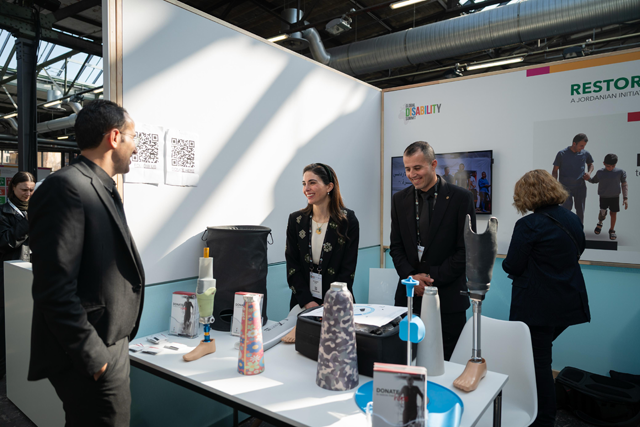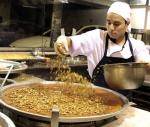You are here
Jordan’s ‘Restoring Hope’ initiative targets global expansion, attracts attention in Berlin Disability Summit
By JT - Apr 03,2025 - Last updated at Apr 03,2025

Visitors to 'Restoring Hope' initiative's booth at the Global Disability Summit in Berlin (Photo courtesy of Royal Court)
AMMAN — "Restoring Hope," a "ground-breaking" Jordanian initiative for amputee support, seeks to expand globally, following its achievements in Gaza over the past six months.
Launched in the autumn of 2024 upon directives by His Majesty King Abdullah, “Restoring Hope” initiative has transformed hundreds of lives in Gaza through the medical cadres of the Royal Medical Services of Jordan working currently at the Jordanian field hospital in southern Gaza.
The initiative's Mobile Amputee Support Units (MASUs) bring "high-quality" prosthetic care directly to patients in challenging environments, "dramatically" reducing the time from injury to mobility.
In his speech on Wednesday, at the opening session of the Global Disability Summit in Berlin, His Majesty talked about the “Restoring Hope” initiative and called on organisations and activists to join its ongoing efforts.
“To date, over 400 amputees, including children, have benefitted and acquired new hope. And behind every statistic is a face, a story, a life of immeasurable value. They are back with family once more. We are immensely proud of the Jordanian doctors and technicians who have responded to the need,” His Majesty said in the speech.
“We call this initiative, ‘Restoring Hope.’ And here at this Global Disability Summit, we ask you, the champions of disability rights, to join us in helping “restore hope” to Gazans, and others in jeopardy, worldwide.”
“Through Restoring Hope, we demonstrated that leadership, compassion, and innovation flourish in the darkest and most difficult of places,” His Majesty said.
The Restoring Hope initiative has achieved remarkable results in its initial phase with nearly 415 patients fitted with prosthetics in the first six months. Some patients have averaged 4,000 steps within one week of fitting. This has been part of ongoing patient monitoring and support.
In addition, more than 40 prosthetists have been trained in rapid-fitting techniques and smart monitoring. Integration with electronic patient records has enhanced follow-up care across the discipline and enabled e-consultations with Jordan specialist centres for trauma and rehabilitation.
So far, two specialised teams have deployed to serve patients and referral pathways have been established for other field hospitals. In parallel, a university-based clinical research programme has been launched to further evaluate these approaches, and over 20 expert briefings disseminated globally, Amman-based Restoring Hope Society said in a statement.
What distinguishes Restoring Hope is its collaborative approach, drawing on insights from thought leaders and pioneers across multiple countries. The initiative represents a paradigm shift in humanitarian healthcare by integrating digital health technologies, innovative prosthetic designs, psycho-social support and mobile care delivery.
"The impact of Restoring Hope extends far beyond the numbers," said Rami Farraj, Chair of the Restoring Hope Society. "We hope to see children being able to return to school, adults regain their independence, and families rebuild their lives. Each prosthetic fitting represents not just restored mobility but restored dignity and opportunity."
As part of the two-day Global Disability Summit, Edward Hall, advisor to the Restoring Hope Society, participated in a panel discussion on Thursday, titled "From Risk Reduction to Recovery: Disability Inclusive Practices for Disaster and conflict”, during which he talked about the objectives and future plans of Restoring Hope Society.
He said that Restoring Hope Society aims to establish Jordan as a regional centre of excellence for rehabilitation and trauma care, serving as a knowledge hub for innovative healthcare delivery in challenging environments. As the model expands, a further regional training session will run during April in Amman.
The initiative exemplifies King Abdullah's commitment to compassionate leadership, innovation, and building regional stability through humanitarian action, Hall said.
The Global Disability Summit brought together world leaders, disability rights advocates, and humanitarian organizations to accelerate progress toward disability inclusion worldwide. His Majesty's participation underscored Jordan's commitment to leading regional efforts in disability inclusion and humanitarian innovation.











